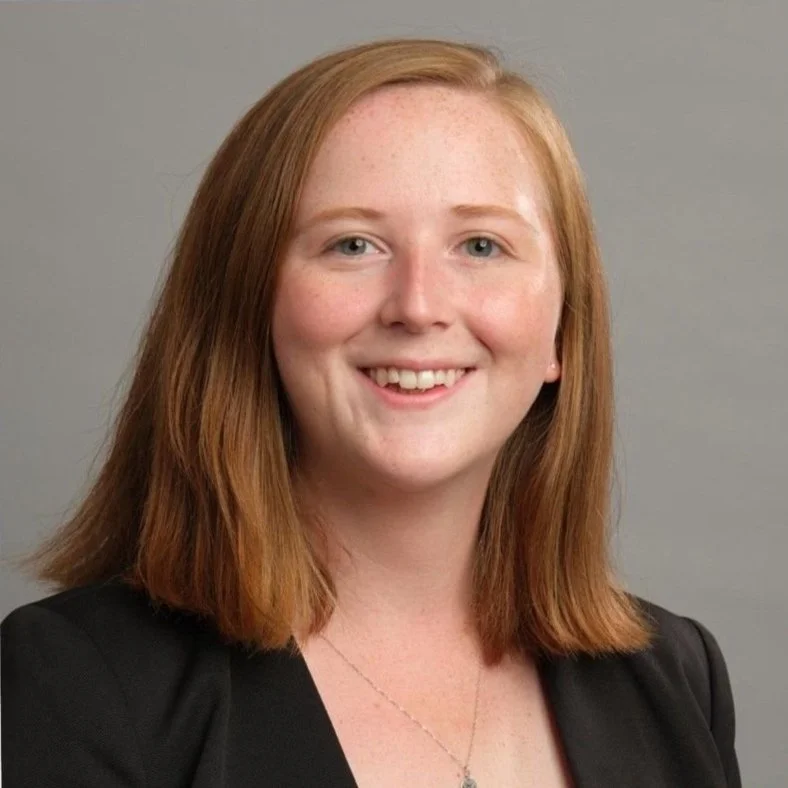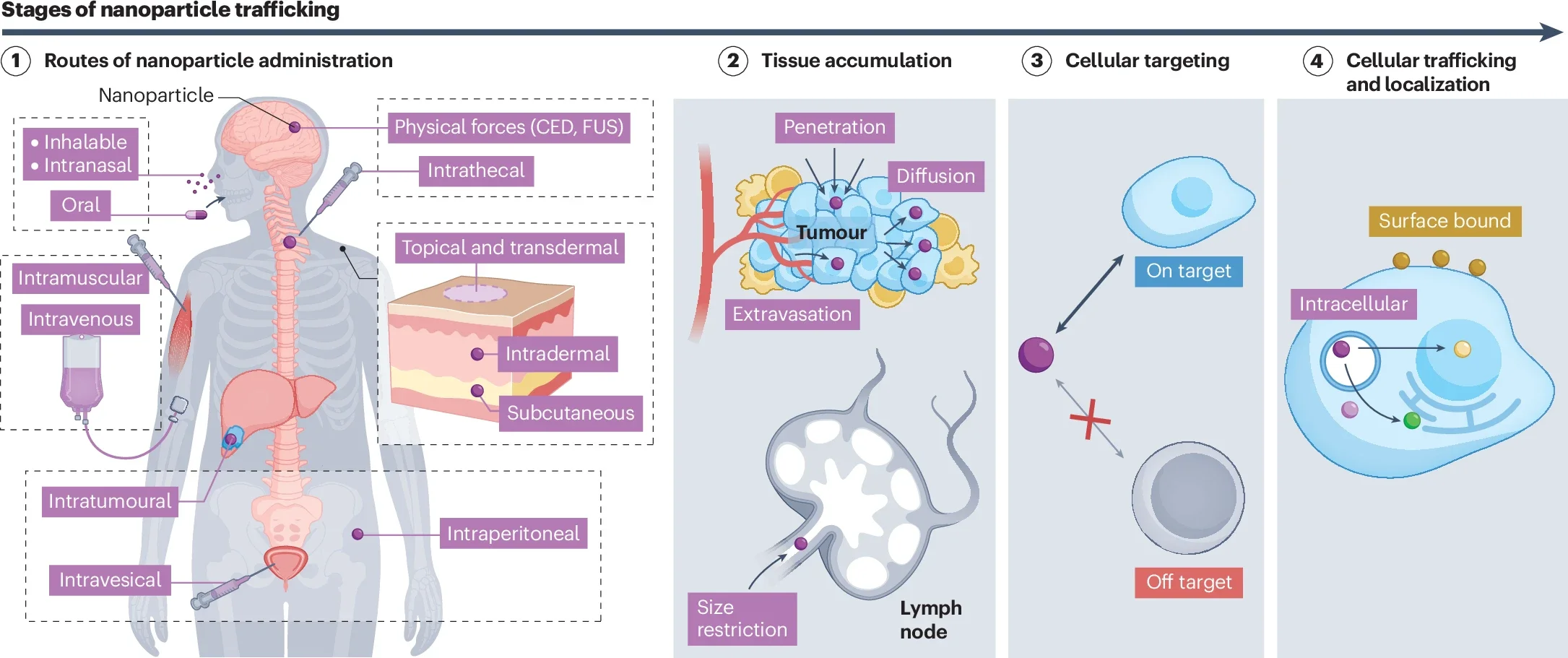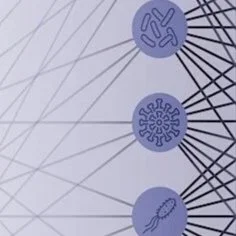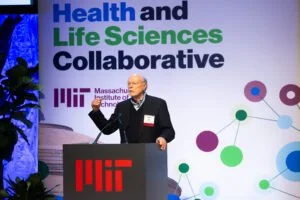August Bulletin
Issue 107
Community Notices
Recordings from the 2025 Koch Institute Symposium on Antibody Drug Conjugates
The 23rd Annual Koch Institute Symposium on Antibody Drug Conjugates: Targeted Cancer Therapies at the Intersection of Chemistry, Biology, and Engineering took place on Friday, June 27, 2025. Kicking off with 2022 Nobel Prize winner Carolyn Bertozzi, our speaker lineup featured an array of industry and academic leaders who discussed current advancements and challenges in deploying antibody drug conjugates (ADCs) as anti-cancer agents.
Save the date: Marble Center Distinguished Seminar with Dr. David Edwards, September 15, 2025 (4-5pm)
David A. Edwards, Ph.D., is a biophysicist, founder, and CEO of Sensory Cloud Inc., a Boston-based startup company aimed at deactivation of mechano-sensitive channels for the treatment of respiratory disease. Prior to joining the company, David was on the faculty of Engineering & Applied Sciences at Harvard University (2002-2019), after having co-founded and sold his first startup company, Advanced Inhalation Research (AIR) to Alkermes. The AIR technology, based on David’s 1997 Science publication describing the design of large porous particles for the non-invasive delivery of injectable drugs, led to the FDA approved Inbrija, inhaled L-Dopa for the treatment of Parkinson’s. While at Harvard, David also pursued large porous particle technology for the development of the first inhaled dry powder BCG for mucosal vaccination against tuberculosis (PNAS 2007, 2008).
Since David’s 2004 PNAS publication describing the impact on respiratory droplet generation of the hydrating of human lungs by endogenous monovalent cations, David’s research has increasingly focused on the respiratory health benefits of the inhalation of monovalent and divalent salt cations, leading to the startup of Sensory Cloud Inc. In recent years, with a series of publications (PNAS 2021, Nature SciReports 2022, Quarterly Reviews Biophysics Discovery 2023, JAMP 2023, LUNG 2024, ERJOR 2024, Nature Communications Earth & Environment 2025), David’s research with a growing number of international collaborators has led to the discovery that, together with other planetary ecosystems, human airways are dehydrating with global warming.
David has founded other companies, including Foodberry, pioneering new food forms based on the natural model of the grape. David is currently Adjunct professor of medicine at Johns Hopkins University, and remains as an Associate in the John A Paulson School of Engineering & Applied Sciences at Harvard University. He is a member of the US National Academy of Engineering, the French National Academy of Engineering (Académie des technologies), and the US National Academy of Inventors. For his work in the creative arts and nonfiction/fiction writing in French & English, David was made a Chevalier of arts and letters by the French Ministry of Culture in 2008.
Bio x AI Hackathon event at the Koch Institute September 17, 4-7pm
MIT Hacking Medicine is co-hosting the BioxAI Pitch Event with the MIT Koch Institute and CSAIL Alliances. The event will convene budding entrepreneurs from various MIT departments, namely PhD students and postdocs, applying ML/AI to biological questions, with a focus on protein biology/drug discovery. For example, early stage founders will pitch for co-founders (max. 2min). Founders and individuals who want to join a team will likewise pitch themselves. This will be an opportunity to learn from guests within and outside MIT, including NSF, CSAIL Alliances, the Koch Institute, among several others. This is the event for you if you are:
interested in scaling up their early stage venture
looking to find a cofounder
joining a team of cofounders
Please apply if you are interested in attending, pitching, or both! Applications will close at 5 PM on September 10th, 2025.
News
Sangeeta Bhatia discusses the Cambridge biotech ecosystem and announces Royalty Pharma collaboration
Implantable device could save diabetes patients from dangerously low blood sugar
A new implantable device carries a reservoir of glucagon that can be stored under the skin and could save diabetes patients from dangerously low blood sugar. Credits: Image: Courtesy of the researchers
(Anne Trafton | MIT News) For people with Type 1 diabetes, developing hypoglycemia, or low blood sugar, is an ever-present threat. When glucose levels become extremely low, it creates a life-threatening situation for which the standard treatment of care is injecting a hormone called glucagon. As an emergency backup, for cases where patients may not realize that their blood sugar is dropping to dangerous levels, MIT engineers have designed an implantable reservoir that can remain under the skin and be triggered to release glucagon when blood sugar levels get too low.
This approach could also help in cases where hypoglycemia occurs during sleep, or for diabetic children who are unable to administer injections on their own. “This is a small, emergency-event device that can be placed under the skin, where it is ready to act if the patient’s blood sugar drops too low,” says Daniel Anderson, a professor in MIT’s Department of Chemical Engineering, a member of MIT’s Koch Institute for Integrative Cancer Research and Institute for Medical Engineering and Science (IMES), and the senior author of the study. “Our goal was to build a device that is always ready to protect patients from low blood sugar. We think this can also help relieve the fear of hypoglycemia that many patients, and their parents, suffer from.”. Read more…
Congratulations to our community members
Research spotlight
Advancing engineering design strategies for targeted cancer nanomedicine. Check out this new review from the Hammond Lab! The review explores the advantages of non-covalent surface modifications of nanoparticles, along with other surface modifications, to modulate nanoparticle trafficking from the injection site, into tumour and lymphoid tissues, to the target cell, and ultimately its subcellular fate.
Job opportunities
Postdoctoral Associate, Stark Laboratory, Koch Institute at MIT. Lab projects involve approaches from molecular and synthetic biology, immunology, glycobiology, and biological engineering. Experimental approaches used in the lab include cloning/molecular biology, protein engineering and biochemistry, mammalian cell/tissue culture, flow cytometry, next-generation sequencing, transcriptomics, and animal models of disease. This is an excellent opportunity for someone interested in exploring a frontier area of immunobiology to impact cancer and immune therapy while working with other passionate scientists in a collegial, interdisciplinary environment. The Stark Lab is committed to maintaining a work environment that encourages and values contributions by individuals from all backgrounds and lived experiences. In addition to professional development opportunities within the lab, will be able to take advantage of close ties to vibrant scientific communities across MIT, at the Ragon and Broad Institutes, and at the Dana-Farber Cancer Institute
Postdoctoral Fellow, Extracellular Targeted Protein Degradation, AbbVie. This postdoctoral role is housed within AbbVie Discovery, a pioneering team dedicated to advancing therapeutic solutions in the fight against cancer and autoimmune diseases. The postdoctoral fellow will embark on a groundbreaking initiative to target cell surface proteins, which constitute nearly one-third of all coded proteins and are pivotal drug targets. While existing technologies, such as bifunctional degraders, have transformed the targeting of intracellular proteins, the degradation of cell surface proteins presents unique challenges. This role will be at the forefront of exploring innovative approaches to address these challenges. Micro-Nano
Fabrication Engineer, Cahira Technologies. Cahira Technologies Inc is an MIT spinoff company building novel sub-cellular sized wireless electronic devices that seamlessly integrate with the brain, enabling brain-computer symbiosis beyond conventional brain-computer interfaces. Cahira is hiring a micro/nano-electronic device engineer with strong background in electronic device physics and expertise in micro-nano fabrication skills. You will be involved in developing electronic devices for wireless brain stimulation. You should have an interest in biomedical implants, though no prior experience is needed in biotech. Strong grasp in electronic devices (diode, transistors, MEMS, band diagrams etc), semiconductor engineering and CMOS technology is a MUST. Experience in micro/nano-fabrication is a MUST.
Funding opportunities
| MIT-MGB Seed Program Initial Proposal | N/A | August 15, 2025 | Burroughs Wellcome Fund: Career Awards at the Scientific Interface - PostDoc | N/A | September 2, 2025 |









